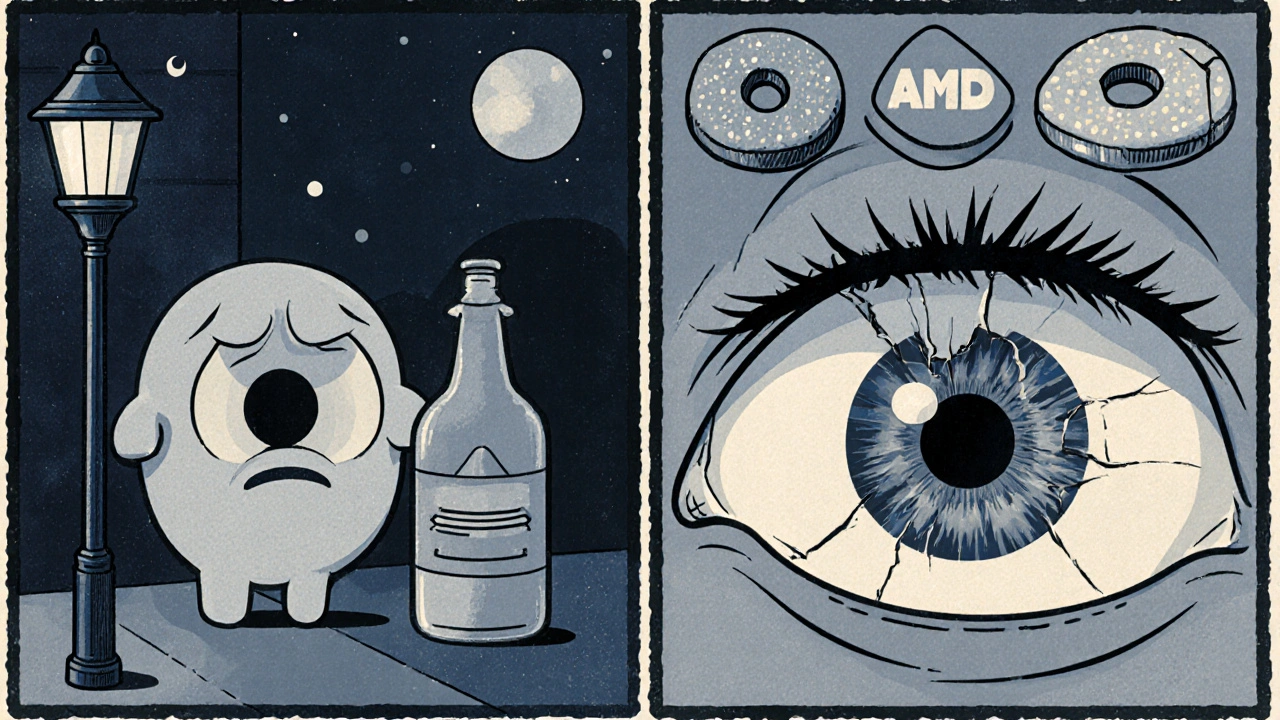Prevent Vision Problems: How Vitamin Deficiency Affects Eye Health
 Oct, 17 2025
Oct, 17 2025
Understanding vitamin deficiency is the first step to preserving eye health and avoiding common vision problems.
Key Takeaways
- Vitamin A, C, E, zinc, omega‑3s, lutein and zeaxanthin are the core nutrients that protect the eyes.
- Deficiencies can lead to night‑blindness, dry eye, cataracts, macular degeneration and even glaucoma.
- Whole‑food sources provide the most reliable absorption; supplements should fill gaps only when needed.
- A balanced diet, regular eye exams and smart lifestyle choices together form a robust defense against vision loss.
Why Vitamin Deficiency Matters for Your Vision
When it comes to vitamin deficiency a shortfall of essential nutrients that support various body functions, the eyes are often the first organ to show signs. The retina, cornea, lens and tear film each rely on specific micronutrients to maintain transparency, cellular health and neural signaling. A lack of these nutrients disrupts biochemical pathways, leading to oxidative stress, inflammation and structural damage that accumulate over years.
Essential Nutrients for Eye Health
Vitamin A a fat‑soluble vitamin critical for photoreceptor function and tear production is the cornerstone of good vision. It exists in two primary forms: preformed retinol from animal sources and provitamin beta‑carotene from plants. Without enough vitamin A, the retina cannot regenerate rhodopsin, the pigment that enables night vision, resulting in night‑blindness and, in severe cases, xerophthalmia.
Vitamin C a water‑soluble antioxidant that protects ocular tissues from free‑radical damage plays a vital role in collagen synthesis for the cornea and sclera. Studies from the Age‑Related Eye Disease Study (AREDS) show that higher vitamin C intake reduces the risk of cataract formation by up to 25%.
Vitamin E a lipid‑soluble antioxidant that stabilizes cell membranes in the retina helps neutralize oxidative stress caused by ultraviolet light. Deficiency is linked to accelerated retinal degeneration and increased susceptibility to macular damage.
Zinc an essential trace mineral that supports the activity of over 300 enzymes, including those involved in visual pigment metabolism concentrates in the retina, especially in the macula. Low zinc levels impair the conversion of vitamin A to retinal, worsening night‑blindness and age‑related macular degeneration (AMD).
Omega‑3 fatty acids essential polyunsaturated fats-particularly DHA and EPA-that compose a large portion of retinal cell membranes are crucial for photoreceptor efficiency and anti‑inflammatory signaling. A diet rich in omega‑3s lowers the odds of dry‑eye syndrome and may slow AMD progression.
Lutein a carotenoid pigment that filters blue light and acts as a powerful antioxidant in the macula accumulates in the retina and protects against oxidative DNA damage. Higher lutein intake correlates with better visual acuity and contrast sensitivity.
Zeaxanthin a close relative of lutein that works synergistically to shield the macula from harmful light also improves glare tolerance and may reduce the risk of late‑stage AMD.
How Deficiencies Translate Into Specific Eye Problems
- Night‑Blindness (Nyctalopia): Primarily caused by insufficient vitamin A or zinc, leading to inadequate rhodopsin regeneration.
- Dry Eye Syndrome: Low omega‑3 intake diminishes tear‑film lipid layers, while vitamin A deficiency reduces mucus production, both contributing to dryness and irritation.
- Cataracts: Oxidative stress from low vitamin C and E accelerates lens protein clumping, resulting in clouded vision.
- Age‑Related Macular Degeneration (AMD): A combination of low lutein, zeaxanthin, zinc, and omega‑3s compromises macular health, increasing the likelihood of central vision loss.
- Glaucoma: Emerging research links low antioxidant intake (vitamins C/E) with increased intraocular pressure and optic nerve damage.

Food Sources That Fill the Gaps
Eating a colorful, nutrient‑dense diet is the most reliable way to meet eye‑supporting needs. Below is a quick reference:
| Nutrition | Top Food Sources | Primary Eye Benefit |
|---|---|---|
| Vitamin A (Retinol / Beta‑carotene) | Carrots, sweet potatoes, liver, kale | Supports night vision, tear production |
| Vitamin C | Citrus fruits, strawberries, bell peppers, broccoli | Collagen synthesis, cataract prevention |
| Vitamin E | Almonds, sunflower seeds, spinach, avocado | Retinal cell membrane protection |
| Zinc | Oysters, beef, pumpkin seeds, chickpeas | Enzyme function for visual pigment |
| Omega‑3 (DHA/EPA) | Salmon, sardines, flaxseeds, walnuts | Dry‑eye reduction, AMD risk lowering |
| Lutein & Zeaxanthin | Kale,菠菜, egg yolks, corn | Blue‑light filtering, macular protection |
When and How to Use Supplements Safely
Even with a balanced diet, certain life stages or health conditions can create shortfalls. Pregnant women, strict vegans and older adults often need supplemental support. Here’s a practical guide:
- Vitamin A: Use preformed retinol only under medical supervision; excess can be toxic, especially for pregnant women. Beta‑carotene from plant sources is safer.
- Vitamin C: 500‑1000mg daily is well‑tolerated and can boost antioxidant levels without risk of hypervitaminosis.
- Vitamin E: 400IU (≈270mg) is the upper safe limit; higher doses may interfere with blood clotting.
- Zinc: 15‑30mg per day fills gaps; avoid taking >40mg for prolonged periods to prevent copper deficiency.
- Omega‑3: 1000mg of combined EPA/DHA is a common recommendation; fish oil capsules should be purified to remove mercury.
- Lutein/Zeaxanthin: 10‑20mg daily (often sold as a combined formula) supports macular health.
Always discuss supplementation with a healthcare professional, especially if you take prescription medications that might interact (e.g., blood thinners and high‑dose vitamin E).
Lifestyle Practices that Boost Nutrient Utilization
Even the best diet can fall short if other habits sabotage absorption.
- Limit Smoking: Tobacco depletes vitamin C and E, accelerating cataract formation.
- Moderate Alcohol: Excessive intake impairs zinc absorption and damages retinal cells.
- Stay Hydrated: Adequate water supports tear production, preventing dry‑eye discomfort.
- Protect Eyes from UV: Sunglasses block harmful UV rays that increase oxidative stress, complementing antioxidant intake.
- Regular Eye Exams: Early detection of deficiency‑related changes allows prompt dietary or supplemental correction.

Common Pitfalls and How to Avoid Them
Many people think a multivitamin covers everything, but few formulations contain the eye‑specific ratios proven in clinical trials. Below are frequent mistakes and corrective tips:
- Relying on Synthetic Beta‑Carotene: Natural beta‑carotene from carrots is more bioavailable. If you use supplements, choose those derived from algae.
- Ignoring Food Pairings: Fat‑soluble vitamins A, D, E and K absorb better with healthy fats. Add a drizzle of olive oil to a salad rich in carrots or spinach.
- Skipping Meals: Intermittent fasting can reduce overall micronutrient intake; ensure you consume nutrient‑dense meals within your eating window.
- Over‑Supplementing: More isn’t always better. Excess vitamin A can cause liver toxicity, while too much zinc can lead to copper deficiency and anemia.
Putting It All Together: A Sample One‑Day Meal Plan
- Breakfast: Spinach and egg‑white omelet cooked in olive oil, topped with diced red bell pepper. Serves lutein, zeaxanthin, vitamin A and healthy fats.
- Snack: Handful of almonds and an orange. Provides vitamin E and vitamin C.
- Lunch: Grilled salmon salad with kale, avocado, pumpkin seeds, and a lemon‑olive‑oil dressing. Delivers omega‑3s, zinc, lutein, and additional vitamin A.
- Afternoon Snack: Carrot sticks with hummus. Boosts beta‑carotene and zinc.
- Dinner: Beef stir‑fry with broccoli, bell peppers, and quinoa. Supplies vitamin C, vitamin E, zinc, and B‑vitamins for overall eye health.
This menu hits the major eye‑supporting nutrients without the need for extra pills, assuming you’re otherwise healthy.
Frequently Asked Questions
Can a vitamin D deficiency affect my eyes?
Vitamin D isn’t directly linked to common eye diseases, but low levels can worsen inflammatory conditions like uveitis. Maintaining adequate vitamin D supports overall immune health, which indirectly benefits the eyes.
Is it safe to take high‑dose vitamin A supplements for night‑blindness?
Only under medical supervision. Excess preformed vitamin A can cause liver damage and birth defects. Most clinicians recommend beta‑carotene from foods or low‑dose supplements instead.
How much omega‑3 should I aim for each day?
Research points to 250‑500mg combined EPA and DHA for general eye health, and up to 1000mg for dry‑eye syndrome. Choose reputable fish oil or algae‑based capsules.
Do multivitamins contain enough lutein for macular protection?
Most standard multivitamins fall short. Dedicated lutein‑zeaxanthin supplements typically provide 10‑20mg per serving, which aligns with the amounts used in clinical trials for AMD risk reduction.
Can I get all eye‑supporting nutrients from a vegetarian diet?
Yes, with careful planning. Green leafy veggies, orange vegetables, nuts, seeds, legumes and algae‑based omega‑3s cover most needs. Vitamin B12 and DHA may still require fortified foods or supplements.

Sarah Hanson
October 17, 2025 AT 20:08Thank you for the thorough overview; the emphasis on whole‑food sources aligns with best practices.
Wyatt Schwindt
November 2, 2025 AT 05:47Vitamin A and zinc are essential for night vision.
Lyle Mills
November 17, 2025 AT 16:27From a biochemical perspective, the antioxidant capacity of vitamins C and E mitigates lipid peroxidation within photoreceptor outer segments, thereby preserving retinal integrity.
Barbara Grzegorzewska
December 3, 2025 AT 03:06Honestly, the average joe thinks popping a multivitamin solves everything-what a naive notion!
Our ancestors thrived on kale, eggs, and fish oil; modern diets are a betrayal of ocular evolution.
Patriotic citizens must champion native produce, not those imported synthetic pills.
Nis Hansen
December 18, 2025 AT 13:45Indeed, the symbiosis between diet and vision mirrors the larger harmony we seek in life; nourishing the eyes is a microcosm of nurturing the soul. Let us cultivate mindful eating as an act of self‑respect and collective resilience.
Fabian Märkl
January 3, 2026 AT 00:25Great points, everyone! 😊 Remember, a splash of olive oil on your veggie bowl helps absorb those fat‑soluble vitamins. Keep those eyes bright!
Avril Harrison
January 18, 2026 AT 11:04Love the practical meal plan – it’s simple, tasty, and covers all the bases without over‑complicating things.
Natala Storczyk
February 2, 2026 AT 21:43Absolutely!! This is exactly what the UK needs – straightforward, no‑nonsense advice!!! No more confusing jargon, just real food for real eyes!!!
nitish sharma
February 18, 2026 AT 08:23It is imperative to acknowledge the role of micronutrients in ocular physiology, as substantiated by peer‑reviewed ophthalmological studies.